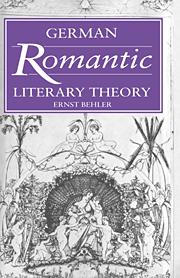Book contents
- Frontmatter
- Contents
- Preface
- List of abbreviations
- Chronology of early Romanticism
- Introduction
- 1 Formation and main representatives of early Romanticism in Germany
- 2 Poetry in the early Romantic theory of the Schlegel brothers
- 3 The theory of Romantic poetry
- 4 Novalis and the mystical dimension of early Romantic theory
- 5 Wackenroder's and Tieck's conceptions of painting and music
- 6 Theory of language, hermeneutics, and encyclopaedistics
- Conclusion: early German Romanticism and literary modernity
- Notes
- Select bibliography
- Index of works cited and primary sources
- Index of subjects and names
1 - Formation and main representatives of early Romanticism in Germany
Published online by Cambridge University Press: 17 August 2009
- Frontmatter
- Contents
- Preface
- List of abbreviations
- Chronology of early Romanticism
- Introduction
- 1 Formation and main representatives of early Romanticism in Germany
- 2 Poetry in the early Romantic theory of the Schlegel brothers
- 3 The theory of Romantic poetry
- 4 Novalis and the mystical dimension of early Romantic theory
- 5 Wackenroder's and Tieck's conceptions of painting and music
- 6 Theory of language, hermeneutics, and encyclopaedistics
- Conclusion: early German Romanticism and literary modernity
- Notes
- Select bibliography
- Index of works cited and primary sources
- Index of subjects and names
Summary
During the last decade of the eighteenth century, Jena was a lovely residential area in Thuringia mostly known for its excellent and progressive university. The city, situated in close proximity to the Wartburg, had been a traditional stronghold of Protestantism. This spirit animated the university, which since its founding in 1558 had maintained its reputation as an intellectually independent, self-governed institution. Its founder was the Saxon Elector, Johann Friedrich, called the ‘magnanimous’. Among the German universities of the time, Göttingen and Leipzig certainly predominated, but Jena, although relatively small, was attractive to students and scholars because of the spirit of innovation and open-mindedness which contrasted favourably with the stale atmosphere of the Enlightenment still dominant at these other institutions.
All of the representatives of early Romanticism were university students, and most of them had followed curricula in the humanities, primarily in literature (both ancient and modern) and philosophy. August Wilhelm Schlegel had pursued all his studies in classical and modern literature at Göttingen University, where he obtained a degree granting him the title of ‘counsel’, perhaps comparable to the present MA degree. Friedrich Schlegel studied law at Göttingen and Leipzig without obtaining a degree, but later, in 1800, became a Doctor of Philosophy of the University of Jena. Tieck and Wackenroder studied at the universities of Erlangen and Göttingen. Wackenroder obtained a law degree from Göttingen, but was also drawn into literary courses by Tieck, who made the study of literature his main object. Schleiermacher's field of study was theology, first pursued at private pietist institutions. But he completed his education at Halle University, where he also studied Kantian philosophy and classical philology with the great Hellenist Friedrich August Wolf.
- Type
- Chapter
- Information
- German Romantic Literary Theory , pp. 13 - 71Publisher: Cambridge University PressPrint publication year: 1993



